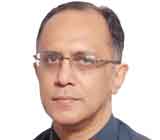 Final year medical students in the UK currently face an uncertain future as they wait to find out what foundation school place they have been allocated following the muddled “situational judgement test” (SJT). They can take cold comfort in the fact that at least they do not have to do the All India Centralised Entrance Test (CET) that students in India have to take.
Final year medical students in the UK currently face an uncertain future as they wait to find out what foundation school place they have been allocated following the muddled “situational judgement test” (SJT). They can take cold comfort in the fact that at least they do not have to do the All India Centralised Entrance Test (CET) that students in India have to take.
There are far more candidates aspiring for post graduate training in India, then there are slots available for training them. The competition for the CET is so keen that many candidates take one or two years off work, to sit at home and prepare for the exam, or to go on various “coaching classes.” The test consists of multiple choice questions to be completed in three hours. It is not a test of their clinical experience and therefore does not select the best candidates based on how well they can cope and perform in a clinical situation. Often candidates who have spent the year sitting at home and reading to crack the CET, score higher marks than those who spent the year doing clinical jobs. It has happened before that candidates who scored highly in the CET have started their training only to discover that they can’t cope with the demands of clinical work and they end up resigning from their post.
It used to be said that eligibility for post graduate clinical training should depend on the candidate’s knowledge, skills, and attitude. In the past, candidates were selected after an interview which gives the trainer and the trainee a “view” of each other. This has now been abandoned as it was considered to be biased and unfair. It was indeed unfair to some people. It is now replaced by the completely anonymous scoring system of the CET. The CET can discriminate between candidates in a consistent and reproducible manner, but is the process a valid means of selecting clinicians for higher training?
The CET is made up of 180 multiple choice questions for 180 marks. As there are hundreds of candidates doing the test, there will be many with the same score. A complicated tie-break system is in place to resolve who takes precedence over the others with the same score. To quote from the website: “The merit position is determined by the number of wrong responses of such candidates. Candidates with fewer wrong responses are considered of greater merit. In case of a tie with two candidates with the same percentage rank and the same number of wrong responses, date of birth shall be considered to determine their position on the merit list. An older candidate shall be placed at a higher merit, failing which marks obtained in a qualifying exam i.e. MBBS shall be considered.”
The person who has the highest rank in the CET is presented with a matrix of training posts available in different parts of the country. They select a city of their choice and a hospital with the best reputation. This position is then deleted from the list and the next candidate makes their selection from the remaining positions.
Once a candidate selects a placement and joins the hospital, if they then resign, they will not be considered for any other placement by the CET board—not even in a non-clinical setting. So they are forced to spend another year studying for the next examination the following year. The candidates who come after them make their choice from the remaining places and are deprived of a chance to join in the place vacated by the top candidate.
After the first round is over, a second round is held to accommodate those with lower marks who were not accommodated in the first round. But positions vacated earlier are now open to candidates in the second round. They speak of death as the great leveller. The opportunity offered to candidates with the lowest marks to be trained in the best hospitals in this manner is another great leveller. Perhaps this is the ultimate form of fairness.
But it is depressing to think that the selection for post graduate training in India this year will be based on a scoring system where rote memory is valued more than bedside skills and aptitude.
Jacob Puliyel is a pediatrician and head of department at St Stephen’s Hospital in Delhi.
